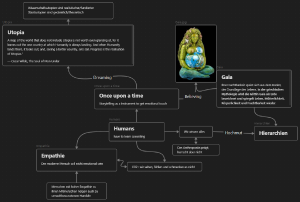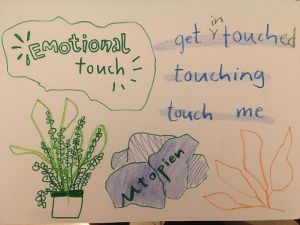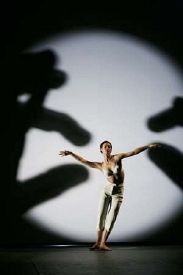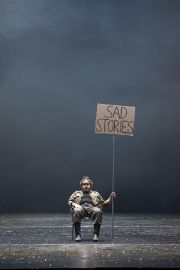No edit summary Tag: 2017 source edit |
No edit summary Tag: 2017 source edit |
||
| (9 intermediate revisions by the same user not shown) | |||
| Line 1: | Line 1: | ||
[[File:Canvas1.png|thumb]] | |||
[[File: | '''Once upon a time ...'''[[File:Utopia.jpg|thumb]]In the book "The Nation of Plants" Stefano Manucso questions the human-conceived hierarchies by presenting our world as a place where all living beings are equally valuable. Nevertheless, he is convinced that in a successful coexistence of beings, humans have to request their self-perception. | ||
We as humans know we are in a state of balancing close to the tipping point. We pretend to know everything. We pretend to be the smartest beings on earth. Meanwhile we are our biggest enemy. To get a deeper understanding, we need to '''switch the perspectives''', '''break down hierarchies''' and be more empathic. | |||
Empathy between humans and their environment, nature and further beings has to be strengthen. | |||
Life has existed for more than three billions of years while homo sapiens are only around 300 000 years old. So our existing is like a grain of sand in the dessert. | |||
[[File: | How can we strengthen the '''connection between humans and all the non-human existence?''' | ||
When was the last time you have been dreaming of utopia? | |||
Do you feel emotional connected to plants? | |||
Does Wanderlust exist without nature? | |||
Three true-based stories in which human show deconstructing behavior: | |||
[[File:Four Pest campaign.pdf|left|thumb]]The stories sound like individual cases, but of course they are not. While the first two are based on the interaction of human and animals the last one points out political misleading and mistreating of human rights. | |||
'''Performatives Storytelling''' | |||
[[File:Schattentheater.jpg|thumb|275x275px|left]] | |||
[[File:SadStories.jpg|thumb|270x270px|center]] | |||
Latest revision as of 21:16, 13 November 2023
Once upon a time ...
In the book "The Nation of Plants" Stefano Manucso questions the human-conceived hierarchies by presenting our world as a place where all living beings are equally valuable. Nevertheless, he is convinced that in a successful coexistence of beings, humans have to request their self-perception.
We as humans know we are in a state of balancing close to the tipping point. We pretend to know everything. We pretend to be the smartest beings on earth. Meanwhile we are our biggest enemy. To get a deeper understanding, we need to switch the perspectives, break down hierarchies and be more empathic. Empathy between humans and their environment, nature and further beings has to be strengthen.
Life has existed for more than three billions of years while homo sapiens are only around 300 000 years old. So our existing is like a grain of sand in the dessert.
How can we strengthen the connection between humans and all the non-human existence?
When was the last time you have been dreaming of utopia? Do you feel emotional connected to plants? Does Wanderlust exist without nature?
Three true-based stories in which human show deconstructing behavior: File:Four Pest campaign.pdfThe stories sound like individual cases, but of course they are not. While the first two are based on the interaction of human and animals the last one points out political misleading and mistreating of human rights.
Performatives Storytelling



